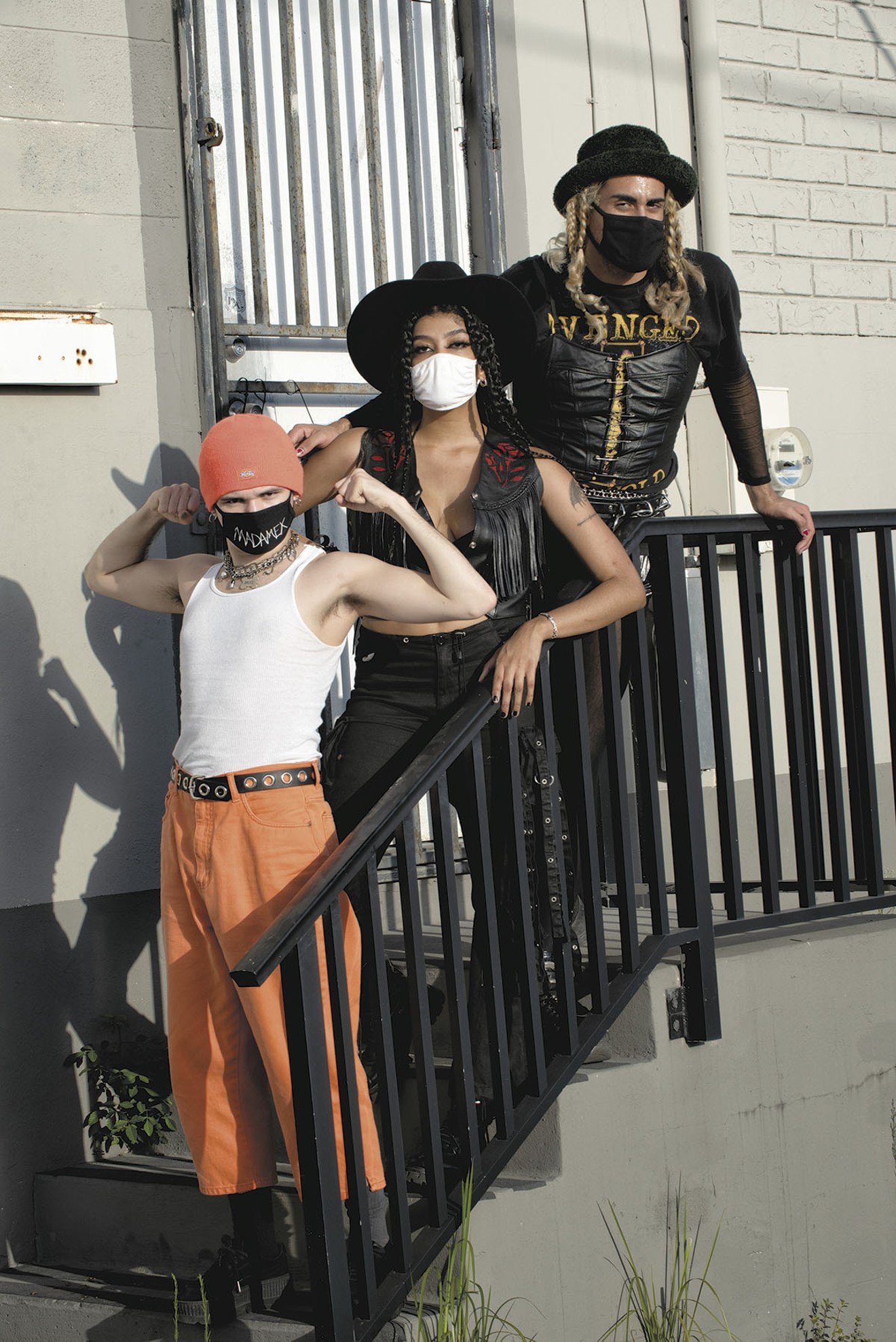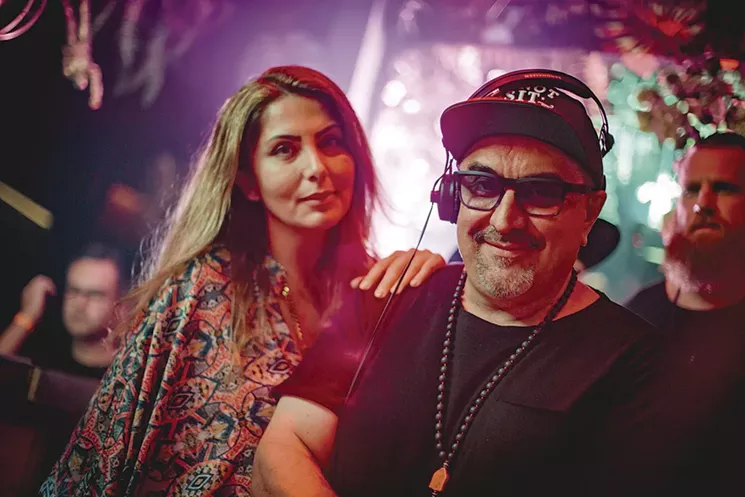Friday and Saturday, March 27 and 28, were going to be a game-changer. Underground party promoters Internet Friends and Portals had teamed with Berlin's Mala Junta to put on a two-day, five-stage festival in Miami called Fifth Layer. Gami could not have been prouder.
"It was honestly going to be one of the biggest projects we've worked on, DIY-wise," the 24-year-old DJ and Internet Friends cofounder says. "It was very ambitious, and it was an amazing location. [It was] something that has never really happened before for our queer community."
Rumors of a novel flulike virus made the rounds. Miami's nightlife industry gave a collective shrug. Another Zika, they thought. It'll blow over in a few weeks. But on Wednesday, March 4, City of Miami officials announced they had pulled the plug on the annual Ultra Music Festival because of health concerns.
"I told my team, 'If Ultra is canceled, our event is not going to happen,'" Gami recounts. "They were like, 'No, if anything, people will just not go to Ultra and come to our event instead.'"
They weren't the only ones. Twitter and other social networks were rife with assurances from promoters, club owners, and DJs that the city's spring bacchanal, Miami Music Week, was still a go.
Then the president declared a ban on visitors from 26 European countries.
"It was this snowball effect of things getting worse," Gami says. "I was like, 'We just announced — what do we do?' We had three DJs coming from Berlin and they were already in the U.S. Then, all these very alarming things started happening. It was very apocalyptic — like, you either stay or leave because the border is closing."
Internet Friends didn't abandon hope until the last minute. When Gami got the call that the city was pulling all outstanding permits for events of any size, she was devastated.
"It feels like your dreams are just being shattered," she says. "We breathe and eat rave. It's what keeps us moving. This is my main source of income. It's my career path."
It has been more than four months since Fifth Layer, along with the whole of Miami Music Week, didn't happen. Since then, Miami and the rest of the nation have been in and out of lockdown limbo. As the city's plan to reopen slides backward and confirmed COVID-19 cases skyrocket locally, there's still no clear path forward for Miami's venues and nightlife staff.
Local Indifference
The recent attempt to reopen restaurants and bars failed so miserably that it made Florida a national laughingstock. Miami leads the state with more than 117,000 confirmed cases as of July 31, with statewide infections peaking at 15,000 per day during the month.
The data is staggering and scary, and it's also demoralizing for the bar and nightlife-venue employees who, according to a 2019 report by 24/7 Wall Street, make up 4 percent of total employment in the Miami metropolitan area. There has been little to no attempt to contact or support a $2 billion industry for the state and a significant part of Miami's allure as a tourist destination.
When asked at what point in future case drops a phase for reopening bars and nightclubs may be feasible, a spokesperson for Miami-Dade County Mayor Carlos A. Gimenez informed New Times that "there is no set point."
"There is no plan for reopening clubs and bars right now," assistant director of communications Patty Abril writes via email. "The mayor makes decisions based on the continuous advice of the medical experts and doctors that he's brought into his team. As far as relief, I believe there is a plan for some of the CARES Act money to go to laid-off restaurant workers."
Asked to clarify whether those benefits have been extended to bar and club employees, Abril noted that bars, cafés, and nightclub owners can apply for support grants up to $15,000 per establishment through the South Beach Wine and Food Festival's Industry Relief Fund.
But Andrea Moreno, public relations manager for the wine and food festival, says nightclubs will not be considered for grants for employee relief from the fund, which raised private donations in addition to the five-million-dollar injection of CARES Act money expected from the county.
"Nightclubs will not be eligible for either fund," says Moreno, referring to the $1.6 million it has already doled and the anticipated CARES Act cash. "All of this is subject to the eligibility requirements mandated by Miami-Dade County, which will be very clearly stated on the [Industry Relief Fund] website once we go live," she adds.
"We feel like we're an abandoned child everybody forgot," says Behrouz Nazari, an internationally touring DJ and the founding owner of the South Beach nightclub Do Not Sit on the Furniture. Nazari and his wife, Megan, moved to Miami Beach and opened the fan-favorite spot seven years ago. The small nightclub at the corner of 16th Street and Washington Avenue has a maximum capacity of 150. The couple supports a staff of about ten, all of whom they consider family. Repeat customers are treated to free drinks and exclusive digital DJ mixes.
"It's a community that we built," Megan says. "We didn't have big promoters or big money. We did it on our own. After seven years, to be abruptly shut down like this — it's terrifying. It's a lot of pain and hurt. Some of our bartenders don't even have money to pay for their rent. On top of that, we have to take out a loan that we have to pay back to the government, and I feel like there's not enough adequate aid for small businesses like us to survive."
Before the recent surge in cases and subsequent shutdown, Behrouz petitioned the city to expand Don't Sit's backyard and allow for yoga classes and sound-meditation sessions.
"Things like that to calm people down, you know, hopefully, we can increase the immune system or something," he says, laughing as if to cover tears on the phone. "I'm going to go with an open heart to the city and ask, but it's so difficult, because the city sometimes gives licenses to the wrong people. We've been loyal to Miami Beach, and we want to bring something back to Miami Beach while a lot of businesses are leaving South Beach."
The Nazaris were able to negotiate a rent decrease with their landlord, cutting their payments in half for three months, but the couple fears it won't be enough. They also continue to pay monthly insurance. In the meantime, Don't Sit hosts livestream DJ sets on Facebook every Tuesday at 3 p.m. They're thinking about charging a "cover fee" as a donation to help pay for electrical and water bills. Still, they remain "optimistic."
"It's tough," Behrouz says, "but we are survivors."
In July, the venue teamed with the National Independent Venue Association (NIVA) to lobby congressional representatives for government support. The program, Save Our Stages, directs Floridians to sign a petition for Senators Rick Scott and Marco Rubio and Rep. Michael Waltz.
"The nightlife is what made us want to move to Miami, because we were so enamored by it," Megan says. "It was such a beautiful, alive city. There was just so much love here and community in that sense. Now I'm afraid it's on the brink of death."
Looking for Solutions
It didn't have to be this way. Countries in Europe shut down in March alongside the U.S., but the two regions approached the issue with drastically different measures. Trump spent much of the pandemic's early stages labeling the coronavirus a "hoax," and state governors continue to vary wildly on their stances toward shutdowns, reopening, mask-wearing, and other protective measures. Europe benefited from more unified leadership and response from the citizenry, and many nations waived rents and financially supported those who were forced out of work.
Residents of France, the U.K., Spain, Germany, the Netherlands, and others honored lockdowns more seriously than their U.S. counterparts. Today, those countries enjoy reopened bars, nightclubs, and outdoor live-music events, on carefully considered phase schedules. German officials have gone as far as pledging €1 billion to "Restart Culture," a financial-aid program for cultural institutions affected by the pandemic, with €150 million earmarked for the live-music industry.
"You look at what Germany is doing and the way that they've opened up, and there's something really big to say about how they all came together, whether it was promoters or whether it was clubs," Becks Lange says.
As founder and creative director at event production company PL0T, Lange organizes Rakastella, the annual music festival on Virginia Key Beach, and a multi-stage Life and Death label party each Miami Music Week.
"They all came together as one voice and started to brainstorm, 'How do we open? What do we do when we open?' They're way more advanced in terms of having a lobbyist for nightlife in government. They have 'night mayors' and entities in their local governments that protect them. They've received millions of dollars and aid relief that our community here in the United States has not received because we're not represented at all."
But Lange, too, remains optimistic about the future. She hasn't given up hope that safety may stabilize in time for Rakastella in December. Even then, with border restrictions and financial impact, she anticipates a lineup exclusively built on local talent and envisions a much more "homegrown" entertainment business for several years.
Travis Rogers, founder of the Miami event-promotions company Humans Alike, tends to agree, though he has a less rosy outlook on the future of public events. His attempt at a "socially distanced" dance party during the brief window of reopening on June 20 met with mixed results.
The team took every precaution: marking places to stand, running cashless bars, requiring masks, equipment cleanings every 30 minutes, allowing groups of only four or less to stand together. Enforcing all those distance guidelines among partygoers after a few drinks was a challenge.
"Before COVID, we were trying to take pictures that make it look as busy as possible," Rogers says. "Now we're like, 'Yes, it looks empty.'"
Scantily populated photos aside, there were plenty of detractors who questioned the decision to hold a public gathering at all. In the week between Humans Alike's first weekend event and the potential second, Florida's COVID cases jumped from 3,000 a day to 15,000. Though they operated on a restaurant catering license and were cleared to continue, Rogers and his crew pulled the plug.
"With the cases going up and everything going on, we felt it was in bad taste to keep going forward," he says. "Like, 'Is that what we're going to be remembered for?' We knew it was the right thing, but it was a bummer because once we do this, who knows when the next time will be? I think now there's going to be so much fear to reopen again."
Rogers doesn't see himself ever leaving the event and nightlife industry, but he isn't taking any chances. He has turned his focus to marketing and e-commerce projects because "after four months of not working, it's just time to stay busy with something else.
"I'm really bummed out about the decisions of our leaders, because there are no plans," he adds. "Miami's a hospitality city. Everything that happens affects the clubs, the bars, the hotels, the restaurants, everything in between. What are you doing to relieve these businesses that have been paying rent for four months? If you're going to shut everything down, at least be like, 'This is what we're offering.' I just feel like we're putting a Band-Aid on a sinking ship."
Shai Ben-Ami, owner of Urban Core Brokerage, is a real estate and business developer focused on building downtown, Brickell, and Wynwood for the past decade.
"[The state government] is trying to close the little tapas bars and small [mom-and-pop] businesses that are like 20 to 30 seaters — yet you can go to Islands of Adventure," he says. "The big hotels are open. I wouldn't be surprised if they start operating a cruise ship soon. It feels like the lobbyists managed to mitigate the big businesses of South Florida, and the little guys are really hurting."
As both a landlord and a tenant, Ben-Ami has made arrangements to pay or accept reduced rents with plans to pay off the balances when revenues stabilize.
"With me, it's different because most of my tenants are my partners and friends," he explains. "Some of the smaller independent restaurateurs that I spoke to downtown are hanging on by their claws to their businesses. One of my tenants, when I was trying to help them get SBA [Small Business Administration] and PPP [Paycheck Protection Program] loans, said, 'I'm scared to get into debt and then close my business, because, ultimately, I'm left with a huge debt.' It's a scary thing for small operators. I totally understand that, and I don't like that either."
Ben-Ami is affiliated with Club Space and has led the development of many downtown restaurants, including Balloo Restaurant, Poke OG, and MargotNaturalWine& Aperitivo Bar. He has made it his mission to revitalize the area. To make it the kind of downtown residents want to walk through in the evenings and invite friends and family. In his opinion, losing these businesses would be more than a personal loss.
"We would basically be turning the clock back ten years," he says. "You'd be looking at at least three to five years to get back to this point. It would feel like you're back in 2010, where no one really cared for downtown and this area. It was a huge wasteland of nothing."
There's No Plan B
The measure of Miami's nightlife industry is an economic one, but it's an economy that's made up of and played out by human beings, and that only elevates the stakes.
"My raves are important, but the health and safety of my peers and my family is very important too," Gami says.
In the months since canceling Fifth Layer, she and Internet Friends have remained active with livestream events, including a recent Pride-themed stream for HBO. It helps keep their DJs busy and puts a little money into their pockets, but Gami doesn't see virtual events as a long-term solution.
"I think it's very hype, like new puppy energy," she says. "It's exciting, and you learn what you have to learn from it. Then you're like, 'OK, this is not the same.' DJ-ing live to an audience that really appreciates you, that energy is unlike any other. I definitely miss conjuring these experiences, these raves, and my sets."
As Internet Friends approaches its fourth anniversary, the collective struggles to imagine the right way to mark the occasion amid chaos, confusion, and mounting social unrest.
"I'm just lost," Gami says. "I remember one of my drag friends telling me once, 'You cannot have a plan B. You need to eat and sleep this career.' I've been living my life this way. Music and underground culture is my life. I don't have anything else. I'm really rooting for Internet Friends to keep going. We are such an established collective here in Miami, something that has really made an impact. It brings me so much joy and energy. It's so hard to replace."














